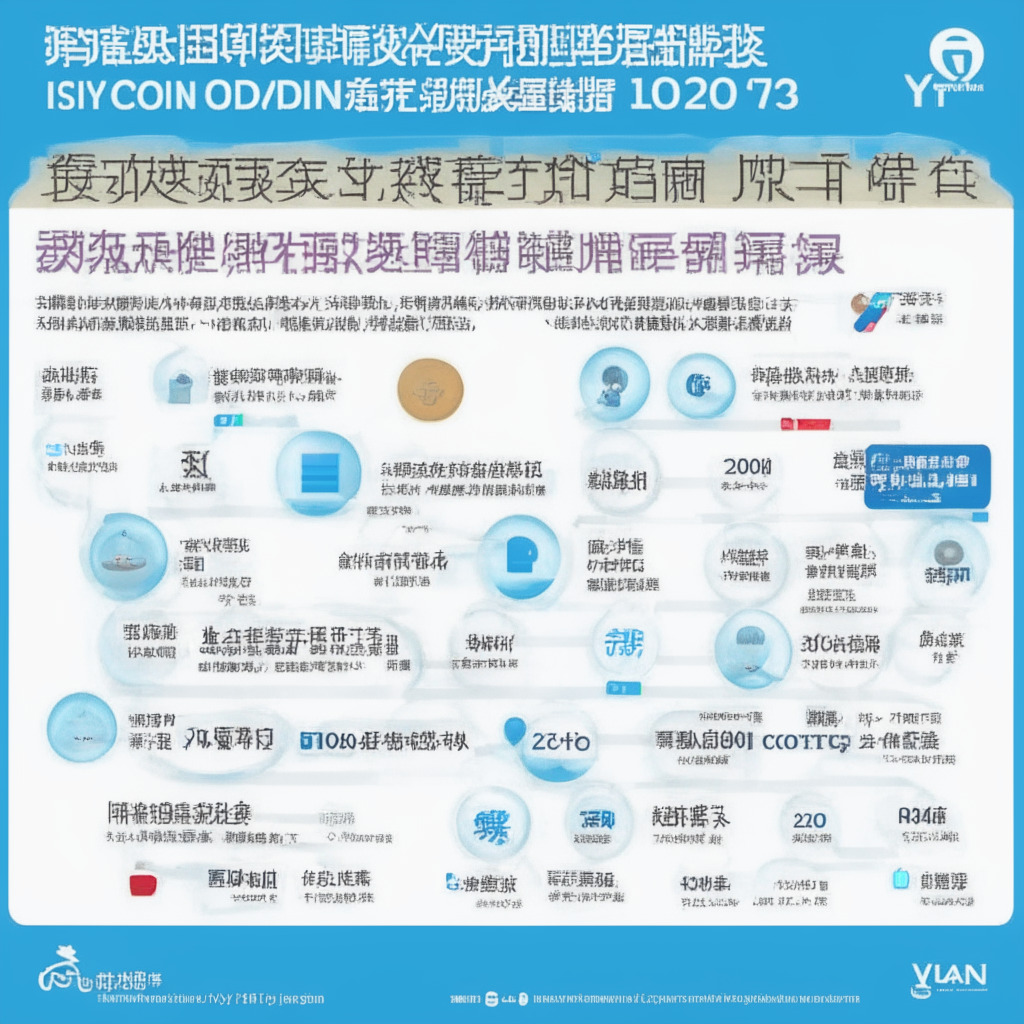“China expands its Central Bank Digital Currency, e-CNY, with plans for an e-CNY linked SIM card. Hong Kong’s soaring crypto licensing costs result in crypto teams relocating to Malaysia. Singapore implements tighter crypto regulations, while South Korea and Japan announce a significant partnership in blockchain gaming. These events reflect the dynamic nature of the global crypto landscape.”
Search Results for: yuan
China’s Digital Metamorphosis: Unveiling the Future of Yuan and the Global Financial Landscape
“China’s capital, Beijing, has announced plans to pioneer the acceptance of the Digital Yuan and Central Bank Digital Currency (CBDC) through various applications. It’s part of a broader goal of fostering digital transformation in the financial industry, with emphasis on the digital yuan central to their strategy. However, implementing CBDC across China faces challenges but holds potential for global financial landscape redefinition.”
China’s Drive Towards Integrating Digital Yuan with Social Security Cards: Boon or Bane?
“Chinese state-run banks aim to integrate the digital yuan with government-issued social security cards in an initiative promoting digital payments. This assists the elderly and rural populations with low smartphone ownership, while addressing the issue of unbanked individuals within these demographics.”
Blockchain Roundup: NFTs’ Record Low Royalties, Phishing Attacks, Digital Rupee and Yuan Adoption, Danish Crypto Regulations and More
June 2023 marked the lowest level of NFT royalties, yet 342 projects raked in royalties over $1M, and twenty crossed the $10M threshold. In other news, RBI is in talks with 18 countries for adopting the digital rupee for cross-border transactions, and Saxo Bank has been ordered to offload its crypto asset portfolio due to regulatory concerns.
Asia’s Blockchain Revolution: DBS Embraces China’s Digital Yuan and What It Means for Global Finance
“Singapore’s leading bank, DBS, has started accepting the digital yuan (e-CNY), bridging the gap between digitized and conventional money. This step validates digital currencies and encourages other global banks to follow suit. However, e-CNY’s current adoption remains nascent.”
Embracing New Era: Digital Yuan Use Expanded To Bus Services in Jinan, China
The city of Jinan in China has announced its adoption of the digital yuan across all bus services. Passengers can now use China’s CBDC for daily commuting, and those who opt for CBDC payments can avail of significant travel discounts. This incentivized move accelerates the wide-scale adoption of digital currencies in day-to-day life.
China’s Leap: Adopting Digital Yuan for Energy Payments – Transformation or Challenge?
China’s energy providers are accepting payments in digital yuan, the country’s central bank digital currency (CBDC). This initiative enables faster transactions, low-cost transfers, accessibility, and transparency. However, it also raises challenges of digital literacy, volatility, and privacy. Companies plan to offer educational workshops to help users understand the differences between conventional payment methods and digital yuan.
Digital Yuan Transforming Public Transport: Pros, Cons, and Future Challenges
The Chinese city of Qingdao is piloting a digital yuan payment solution for public transport using NFC technology, enabling payments via mobile devices even without power or network coverage. Meanwhile, Ningbo plans to distribute $140,000 worth of CBDC discount tokens in digital envelopes. These developments mark significant progress in central bank digital currency adoption.
Digital Yuan Expansion in Chinese Banking: Pros, Cons, and the Future of CBDCs
Chinese banks plan to expand the use of the digital yuan for purchasing wealth management products, allowing customers to connect their central bank digital currency (CBDC) holdings with securities accounts. This move strengthens the digital yuan’s practical applications in the financial industry and continues its ongoing rollout, but potential adverse effects on privacy, freedom, and the global economy remain to be seen.
Digital Yuan Takes Center Stage at Summer World University Games: Pros, Cons & Impact
Student athletes will use China’s digital yuan at the Summer World University Games in Chengdu, marking the first major international sports event to officially adopt the digital currency. The event aims to generate interest in digital yuan, promoting its adoption and showcasing the potential of CBDCs in future global events.
Digital Yuan Adoption Surge: Protecting Citizens from Emerging Scams and Fraudsters
Chinese police report an increase in digital yuan-themed scams amidst the CBDC adoption drive. Fraudsters create authentic-looking apps using digital yuan logos to dupe citizens into transferring their money to illegitimate accounts. Authorities emphasize cybersecurity measures and public awareness campaigns to mitigate these risks while urging individuals to remain vigilant and understand potential risks associated with new technologies.
Bridging the Digital Divide: Offline Digital Yuan Hard Wallets for Elderly and Rural Citizens
Changsha city in China is introducing offline digital yuan “hard wallets” to cater to elderly citizens and children and promote digital currency adoption. These wallets, compatible with IC cards, 2G phones, and IoT devices, allow password-free micropayments and target people who do not own smartphones, especially in rural areas.
De-Dollarization Wave: Pakistan’s Yuan-Based Oil Import and Global Implications
Pakistan’s recent oil import from Russia, using China’s Yuan, showcases the growing momentum towards de-dollarization and the exploration of alternative currencies, such as Bitcoin, in international trade. This shift may impact the US dollar’s dominance and global market stability, requiring careful risk assessment.
Digital Yuan’s Impact on Charities & Corporate Loans: Transparency Benefits vs Privacy Concerns
Chinese charities are accepting digital yuan donations, increasing the digital currency’s reach into new sectors like corporate loans. The digital yuan’s transparency improves donor confidence, ensuring funds reach intended projects and enhancing the credibility of charitable donations. However, concerns about centralization, privacy, and security linger as the currency’s adoption grows.
Digital Yuan Integration in Asian Games: Progress or Global Power Play?
The digital yuan is becoming a predominant form of payment in China, with venue cities for the Asian Games incorporating central bank digital currency (CBDC) transport solutions. The updated digital yuan app’s “ride code” function lets users scan their devices on the Hangzhou Metro, allowing for fast and efficient public transportation payments.
Yuan Depreciation vs Dollar Strength: Impact on Bitcoin and Global Crypto Markets
China’s yuan (CNY) experienced a 2.7% depreciation against the U.S. dollar (USD) this month, historically considered bullish for alternative assets like bitcoin and gold. However, the strengthening U.S. dollar could lead to continued monetary tightening worldwide, posing a headwind for risk assets, including cryptocurrencies.
Digital Yuan Rising: Impact on Healthcare, Energy, and Privacy Concerns
The digital yuan’s breakthroughs in healthcare and energy sectors enable patients to pay for medical expenses and governments to settle utility bills using China’s CBDC. However, rapid expansion raises concerns about privacy and centralization of financial control.
Digital Yuan’s Impact on Chinese Financial Landscape: Pros, Cons, and Debates
China’s financial service providers now allow citizens to pay for wealth products using the digital yuan, marking a significant milestone for the nation’s CBDC. The China Securities Regulatory Commission has approved the first application scenario for the digital yuan in the securities market, enabling investors to purchase public funds and financial products with the CBDC.
Digital Yuan Loans for Tech Startups: Transforming Finance or Risking Instability?
The Hunan Province in China has introduced digital yuan loans for tech startups, as the country explores central bank digital currency (CBDC) financing options. With real-time online lending, digital yuan can save time and handling fees, promoting small businesses and showcasing CBDC potential in lending. However, potential risks, such as market volatility and cybersecurity, must be addressed diligently.
Digital Yuan Adoption in Education and Public Transport: Revolution or New Challenges?
Chinese provinces are promoting digital yuan adoption in sectors like education and public transport. Jiangsu plans to launch a platform for citizens to pay fees and receive scholarships in digital yuan, while Jiangmen city’s entire bus network will accept CBDC payments.
Digital Yuan’s Strides and Hurdles: Can CBDCs Rival Traditional Cryptocurrencies?
BNP Paribas and Bank of China’s recent partnership promotes the digital yuan to corporate clients, advancing blockchain technology and digital currencies. However, widespread adoption remains uncertain, as the public’s response to China’s central bank digital currency (CBDC) could impact its success in challenging traditional cryptocurrencies and fostering blockchain innovation.
BNP Paribas Connects Digital Yuan Wallets: Integration Breakthrough or Power Shift Concern?
BNP Paribas connects digital yuan wallets to bank accounts, enabling corporate clients to access e-CNY via the Bank of China’s system. This could facilitate seamless transactions but raises concerns over China’s financial power and privacy issues.
Russia’s Shift in Economic Strategy: Buying Chinese Yuan for International Reserves
Russia is set to purchase Chinese yuan for its international reserves, indicating a strategic shift in its economic approach. This move, seen as a positive development, could signal a more stable Russian economy and have potential implications on the ruble and wider market as Russia seeks to rebuild its reserves amid international sanctions.
The Great Currency Showdown: U.S Dollar vs Euro vs Chinese Yuan in the Tripolar World
The global landscape in reserve currencies is rapidly evolving, as the U.S. dollar’s dominance is […]
Pioneering a New Frontier: China Daily’s Venture into the Metaverse and NFTs
“China Daily, an English-language newspaper giant, has announced a $390,000 budget for creating a metaverse and non-fungible tokens (NFT) platform. This groundbreaking initiative, soliciting offers from both domestic and international blockchain firms, highlights the escalating global interest in NFTs and the metaverse, potentially morphing the future of journalism and content creation.”
China Daily Ventures into NFT: An Ambitious Leap or A Trepid Path?
“China Daily, a CCP-owned newspaper, intends to launch an NFT platform in collaboration with a third-party blockchain firm. With a fund amounting to 2.813 million yuan, the aim is to foster Chinese civilizational influence through tech including Blockchain, AR/VR, NFTs, cloud computing and big data.”
Taiwan’s Upcoming Crypto Legislation: Progressive Regulation or Stifling Clampdown?
Taiwan plans to propose a special law to regulate emerging crypto businesses by November 2023, driven by concerns over offshore markets’ activities. There’s consensus on needing unique legislation for crypto, dissimilar to traditional financial instruments. Taiwan’s Financial Supervisory Commission is helping, releasing guidelines for investors’ protection, including complete segregation between exchange treasuries and customers’ assets. Critics argue that over-regulation might hinder organic growth and innovation.
Russian Legislator Predicts Global Foray of Digital Ruble by 2025, Possible Shift in International Trade
A high-ranking Russian legislitor, Anatoly Aksakov, predicts that domestic corporations will utilize the nation’s digital ruble, a Central Bank Digital Currency (CBDC), by 2025, especially in Latin American nations. He also suggested potential usage could transform “mutual settlements” among these nations.
Regional Crypto Reality: From VPN Penalties to CBDC Airdrops in Asia’s Landscape
“In the Asian crypto landscape, contrasting narratives surface – rigid policy making restricts tech freedom, exemplified by a developer penalized for VPN use by China’s Great Firewall, versus progressive digital adoption, as evidenced by Hangzhou’s 10 million e-CNY airdrop and Alibaba’s move into crypto securities.”
Tencent’s Alliance with PBoC: A Bold Move towards Digital Currency Dominance or a Risky Bet?
“Tencent, the operator of WeChat and WeChat Pay, is teaming up with the People’s Bank of China to promote the use of the digital yuan via Project mBridge. While this challenges the dominance of WeChat Pay and Alipay, the digital yuan is anticipated to complement rather than compete with these platforms. This venture signifies a technological revolution in payment systems, though its uncertainties remain to be explored.”
Decoding CBDCs: User Privacy, Monetary Freedom, and the Legal Framework
“The future of CBDCs will be influenced by user privacy and monetary freedom of choice, according to Agustín Carstens of the BIS. Legal frameworks protecting user privacy are crucial for their mass adoption. The legitimacy of a CBDC comes from the central bank’s legal authority to issue it, hence legislation is imperative.”
Balancing Acts: mBridge’s CBDC Project, Opportunities and Geopolitical Concerns
The mBridge Central Bank Digital Currency (CBDC) project, comprising members from China, Hong Kong, Thailand, UAE, and BISIH, is preparing for expansion. The project offers faster, cost-effective, and transparent cross-border transactions. Concerns rise from potential exploitation for sanctions evasion.































